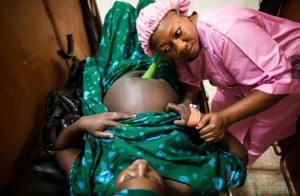>> Pain. Loss. Loneliness. Too many women who suffer from >>obstetric fistula live these words every day.
Pain. Loss. Loneliness. Too many women who suffer from >>obstetric fistula live these words every day.
And although fistula is highly preventable and treatable, over 2 million women around the world continue to live with this childbirth injury and its devastating effects.
Students at UNC-Chapel Hill are asking the question: is obstetric fistula a women’s rights issue? >>Take their quiz.
A consequence of prolonged or obstructed labor, obstetric fistula is a hole that forms between the vagina and the bladder and/or rectum. It happens when a baby’s head or other body part presses too long against the soft tissue in the mother’s pelvis and cuts off the blood flow. Within three to ten days, the tissue may die and create an opening. The mother will then suffer chronic urinary and/or fecal incontinence. >>In most cases, the baby dies in the birth canal. For the mother, fistula can lead to infection, kidney disorders, severe nerve damage, paralysis, and even death if left untreated. Women with fistula are often abandoned by their families and shunned by their communities.
Nicholas Kristof, a New York Times global health columnist, called these women >>the lepers of the twenty-first century. And he was right. Because even after a woman’s fistula is repaired, she may not be embraced again by her community.
How do you reintroduce yourself back into a community that has banished you? One way is by becoming something of an economic powerhouse. IntraHealth International and the Clinton Global Initiative (CGI) are partnering with UNFPA/ Maili, SamaHope, Direct Relief, Orange Mail Foundation, Inner Wheel Mali, and the Peter C. Alderman Foundation to create entrepreneurial opportunities for women in Mali with obstetric fistula.
In order to help women in developing countries, IntraHealth International and CGI need the support of women in developed countries. That’s us. Here are three ways to help end obstetric fistula in three minutes:
- >>Take the quiz.
- >>Donate.
- Spread the word.
>>Read more about IntraHealth’s Clinton Global Initiative Commitment to the women of Mali.
There are no comments
Add yours